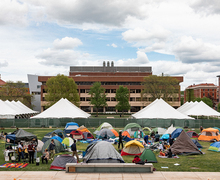Selling safe sex: Shippensburg University creates controversy by providing students contraceptives through vending machine
Micah Benson | Art Director
Students at Shippensburg University, located in Pennsylvania, can now access multiple forms of contraceptives through a vending machine in the health center. The vending machine provides Plan B, condoms and pregnancy tests.
Even though the U.S. Food and Drug Administration approved the vending machine, controversy still surrounds the topic. Religious and health advocates both have reasons to protest the easy access to birth control.
Some health advocates believe students will get the birth control remedy they need without consulting a health care professional about the risks. Others believe it may deter sexual assault victims from seeking help, according to a Feb. 7, 2012 Huffington Post article.
Peter Gigliotti, Shippensburg University’s executive director of the Office of University Communications and Marketing, said he believes the timing of the installation of the vending machine is what attracted the media attention.
“This was all based on student input and research, and the decision was made by professional medical staff,” Gigliotti said. “We are providing a safe, legal service to our students. The only different aspect is the vending machine.”
Gigliotti said the machine sparked media attention because it was installed last winter, which was about the same time President Barack Obama discussed the issue of birth control at religiously affiliated institutions. He added that Shippensburg was thrown into the media as a way to report on the issue of birth control itself.
A Shippensburg University campus-wide survey found that 85 percent of students wanted an emergency contraceptive machine available on campus, according to a Jan. 30 Fox News article.
“I think it’s great that the school is giving us this option,” said Chelsea Wehking, a junior at Shippensburg University, in the Huffington Post article. “I’ve heard some kids say they’d be too embarrassed to go into town and buy Plan B.”
Gigliotti said there is a strict process involved in verifying that the person acquiring the contraceptive is a Shippensburg student and is of legal age to buy it.
Plan B is one of the contraceptives sold in the vending machines, and is legal for a 17-year-old to purchase over the counter. Gigliotti said Shippensburg trusts its students to consider their options, consult the health and religious services provided by the university, and make their own decisions.
He added that Plan B is seen as an abortion pill, but it does not terminate an existing pregnancy. Instead, it prevents ovulation. The pill will also not affect an existing pregnancy.
Last year, students at the Shippensburg student newspaper investigated other ways to get emergency contraceptives, Gigliotti said. Students found they were able to go to a pharmacy and purchase Plan B after showing valid identification.
The vending machine makes contraceptives available at times when pharmacies are not open. The location is more convenient and students can feel at ease walking into a health center equipped with the professional help they need, Gigliotti said.
Said Gigliotti: “This was also about our belief in providing student input in all types of decisions.”
Published on February 6, 2013 at 10:26 pm
Contact Marissa: [email protected]




